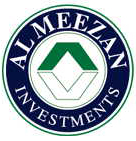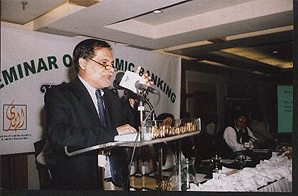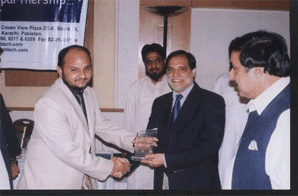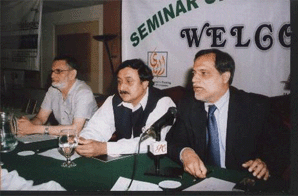 |
 |
 |

Zubair Mughal Editor IBF News talks to Pervez Said Director Islamic Banking Department SBP |
|||||||||||
|
|||||||||||
Pervez Said |
|||||||||||
| Profile: | |||||||||||
Mr. Pervez Said is the Director of the Islamic Banking Department at the State Bank of Pakistan. Mr. Said has a MBA from Ohio University, USA. His overall work experience is spread over 25 years evenly split between businesses and banking. He has rich business experience working for various multi-nationals such as Johnson & Johnson, where he was the Managing Director for Pakistan. He has also worked for Reckitt & Colman, Unilever and Exxon Chemicals. He started his banking career with Citibank Pakistan in conventional banking. He moved out of conventional banking into Islamic banking for reasons of conviction. He has worked on Islamic Banking with Citibank, Standard Chartered Bank (SCB) and MashreqBank in the UAE. Currently he has taken the role of a regulator for Islamic banking industry in Pakistan where he heads the Islamic Banking Department at the State Bank of Pakistan serving as the Director of this department. He along with his team is responsible for promoting and implementing Islamic banking in the country. His mission is to make Islamic banking as a banking of first choice in the country. His strategy is to establish Islamic banking as a parallel banking system comparable and compatible with conventional banking system while being fully Shariah compliant and capable of supporting the entire banking system if it were to be transformed onto the Islamic system. The progress has been very good and the implementation smooth with low incidence of issues. |
|||||||||||
| Interview: | |||||||||||
Zubair Mughal: What is the recent development of Islamic Banking in Pakistan? How much Islamic banking branches are operating right now? Pervez Said: Presently, there are 99 branches of full-fledged Islamic banks and 58 Islamic banking branches of conventional banks in nearly 24 cities of the country. Zubair Mughal: What is the strategy of SBP for the development of Islamic banking in Pakistan? Pervez Said to promote Islamic Banking in Pakistan, State Bank initiated following three pronged strategy and set out detailed criteria in December 2001 for the establishment of vibrant Islamic banking system. 1. Setting up subsidiaries by the commercial banks for the purpose of conducting Shariah compliant transactions; 2. Specifying branches by the commercial banks or Islamic banking windows which would deal only in Islamic products, and 3. Setting up a new full-fledged commercial bank to carry out exclusively banking business based on proposed Islamic products. Following more measures have been taken:
Zubair Mughal: Being the authority on Islamic banking in Pakistan, please explain the major challenges of Islamic banking in Pakistan now? And how SBP tackles these challenges? Pervez Said:. Since Islamic Banking is an emerging field, there are a number of challenges being faced by this industry e.g. Public awareness/understanding, product innovation, development of infrastructure and allied fields, regulatory and supervisory framework, Shariah compliance in letter & spirit, availability of trained Islamic Bankers and Shariah Scholars etc. Zubair Mughal: How much focus will you be placing on developing retail banking going forward? Pervez Said: A lot of focus will be on retail banking. Actually, in the side about 80-85% of the products that a conventional bank offers can be offered by Islamic banks. In fact, it’s 100%, but we do not do that, the reason being that with certain products, such as personal finance and credit cards, the underlying structure of these products are such that they can be misused very easily. Currently, a lot of regulators do not allow those products because the systems are not strong enough. However, it is up to the Islamic banks to design retail banking products for their customers.
Zubair Mughal: What is the contribution of SBP for the development of Islamic banking worldwide? Pervez Said: State Bank has been an active supporter of Islamic banking not only in Pakistan but also in other countries. To promote and strengthen the Islamic banking system SBP became the founding member of Islamic Financial Services Board (IFSB) which is a standard setting body with regard to Islamic financial products. Further, SBP is working closely with International Islamic Financial Market (IIFM), a Bahrain based international institution, which was established to tab the challenging issue of liquidity management faced by Islamic Financial system internationally. IIFM is interalia working on developing Shariah compliant liquidity management products for the Islamic banking industry across the globe. In order to bridge the demand and supply gap of skilled human capital, SBP has signed a memorandum of Understanding (MoU) with International Centre for Islamic Finance (INCEIF), Malaysia which would help in producing a world class human capital to serve this sector. To further strengthening the regulatory and supervisory framework for Islamic banking, a memorandum of understanding has also been signed with SECP through which both the institutions would work jointly on the regulatory issues where their combined input is considered essential. Zubair Mughal: There is big dilemma in human resources training in Pakistan and also worldwide. What is the SBP strategy for this issue? Pervez Said: Yes, this is one of the key challenges being faced by the Islamic Banking Industry in this regard SBP has also started a certificate course on Islamic Banking through its subsidiary NIBAF, however, this course is initially targeting the need of Islamic Bankers. Further, other training and educational institutions are also encouraged to offer Islamic banking courses to fill the gap. We are encouraging universities to introduce more Islamic banking courses. Moreover, we have plans to have a “School of Islamic Banking & Finance” who would cater to needs of this industry. Zubair Mughal: How much growth you predict in Islamic banking industry in the next decade in Pakistan? Pervez Said: Islamic banking is expected to grow exponentially in the next decade. In the medium-term it is expected to have 12% market share in the overall banking assets of Pakistan by year 2012.
Zubair Mughal: What is Basle II? How are you progressing with Basle II compliance in Pakistan?Presently all the banks in Pakistan are following the risk based capital approach. Pervez Said: According to current framework, all the banks have to maintain capital which is minimum of 8% of its risk weighted assets or Rs. 3 billion whichever is higher. However, the Basel II approach would require the banks to maintain capital on a more comprehensive risk assessment framework. Basel II requires the banks to maintain capital not only on the basis of risk assessment of assets whereas some other factors would also decide the capital requirements for a particular bank. In nutshell the Basel II framework is based on following three pillars:
SBP has asked the banks to put in place the desired framework and take the necessary actions so that Basel II could be implemented by Dec.2007. The banks are presently working on implementation of this new capital requirement approach. Zubair Mughal: What is the recent market of Sukuk in Pakistan? Pervez Said: The following Sukuks have so far been issued in Pakistan: Sukuk Tenor Amount Return Zubair Mughal: Any message to the reader of the newsletter? Pervez Said: Creation of a financial system hat is fre of inerest and follows the Sharaih in letter and spirit is not an issue of a single institution or a few people. It is an issue that is desirable by a majority of Muslims. Therefore the development of such a system is the joint responsibility of all Muslims. We must all put our shoulders together and push in any way that we can to promote this system. Those who can help from the industry side should do so. Those who can help from the users side should do so. Those who can educate and train, like Al Huda should do so. If we expect a few institutions and a few individuals to develop this system on their own then it will take a long time and will deprive many others to take part in this great job. So all those who read this should think resolve to help the developing of this system in which ever way and capacity that they can. |
|||||||||||
| Back to main | |||||||||||
 |
 |
 |
|
 |
|
 |
|


